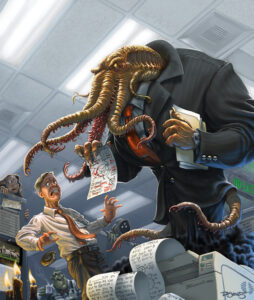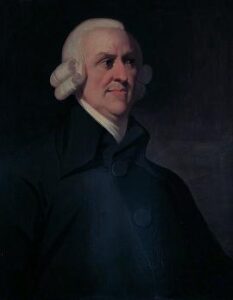This is Faith in Play #14: Wickedness, for January 2019.

“Wage Slave” by Michael Dashow. Used with permission. http://www.michaeldashow.com/
In discussing Dungeons & Dragons® alignment, as we began last May with True Religion and continued looking at that which the game calls “good” in Goodness, it is important to remember that each alignment is something in which people actually believe. That becomes a problem when we turn our attention to “evil,” because we tend to stereotype it in cartoonish ways, with villains who are depraved and monsters that are sadistic. In so doing, we reassure ourselves that we are not evil, because we are not like that. Yet in defining that which is the polar opposite of “good” or beneficent, the game has something far more subtle, far less heinous, in view. Evil is embraced as a belief by perfectly sane sound reasonable people, not just Cthulhu cultists and reclusive Shakespearean witches. It is something people—even respected famous people—believe to be the way the world is and how we ought to respond within it. In fact, if you examine yourself carefully, you might discover that you yourself are aligned “evil,” or at least have some significant aspects in your true beliefs that reflect an “evil” world view.

Think about it: if “good” is defined as “beneficent,” seeking the greatest good for the greatest number of people and ultimately putting the good of others above that of yourself, then “evil” must be the opposite of that—and the opposite of beneficence is selfishness, of putting yourself first.
This is very popular, and you’ve undoubtedly been told to embrace this view many times in aphorisms such as “look out for number one.” However, it is more pervasive than that. The inventor of economics, Adam Smith (pictured), put forward a philosophy that asserted that the best outcome for the world, and the right way to achieve that outcome, is that everyone should always put himself first, act in the most selfish way possible, seeking his best benefit. He further asserted that everyone in fact did this, that those who claimed to be acting beneficently were actually acting in what they perceived as their own best interest. That is, saints act seemingly selflessly because they expect a greater profit in the long term from God than they could receive in the short term from taking things for themselves now. If you want to make the world a better place, the theory goes, you do it by maximizing your own profit. You act as selfishly as you can.
We call this wicked theory “capitalism,” and it is the basis for economic systems worldwide, embraced by many Christians as if it were divinely given to us. It is the very definition of evil, and its best redeeming aspects are first that it works by taking advantage of the natural selfishness of most people, and second, as Winston Churchill once said of democracy, it is the worst economic system except for all the others. It works because people are naturally selfish, naturally evil, and not naturally beneficent or good, as socialism requires.
We might also cite Charles Darwin’s contribution to our embrace of evil. His evolutionary principle, the survival of the fittest, was intended only as a means of explaining what drives evolution—why some species dominate and others vanish. It has, however, been applied to every aspect of life. Fit businesses thrive while unfit ones collapse, useful ideas thrive while less useful ones fade, powerful nations grow while weak nations perish, and when it comes to people, those who can obtain an advantage do well while those who cannot overcome the oppression of others fail. It is ultimately a concept of selfishness, of self-interest, of putting yourself first.
This is why when I originally wrote about the evil alignment in Game Ideas Unlimited, I said that Adam Smith was the patron saint of evil. You don’t have to be a sadistic killer to be wicked. You only have to put yourself first, put your own interests above those of everyone else.
Many of you probably already do that. If you do, your real belief is what the game calls “evil.”
It’s amazing how realistic the game can be.
Previous article: The Evils of Monopoly®.
Next article: Gamism.
Like that Lovecraftian image at the top of the post? Illustrator Michael Dashow allowed us to use it free of charge. If you like it, you can thank him for his generosity by buying a gaming mat with this or one of his other paintings from Inked Gaming. The CGG receives no compensation other than goodwill for sales through that link.
